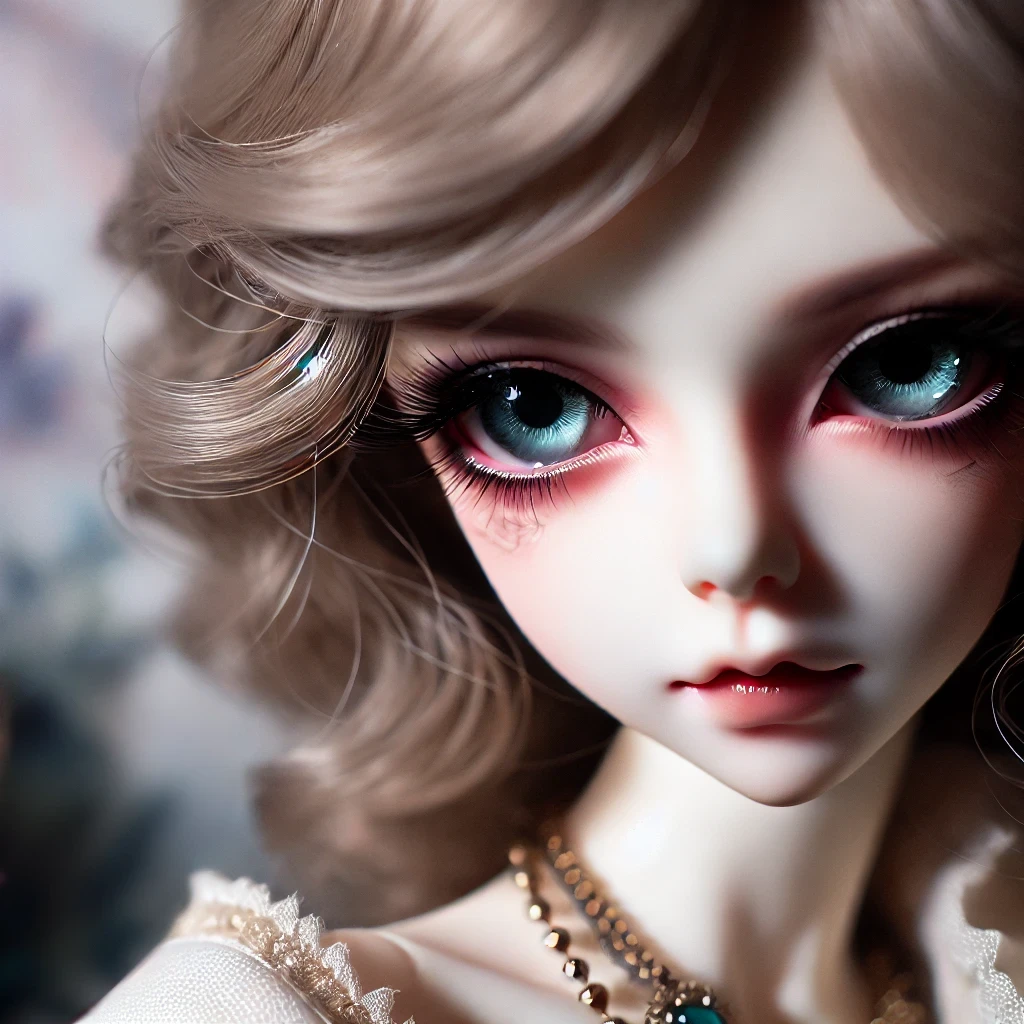Ball-Jointed Dolls, or BJDs, are unique collectible dolls that have become very popular. They come from Asia and have special joints that let you pose them in many ways. These dolls are made from high-quality resin, making them look very real and often anime-like.
A BJD (구체관절인형) is a highly poseable collectible doll with ball-and-socket joints. Made from resin, it can be customized with different clothing, 머리카락, and makeup. These dolls are popular for their craftsmanship and realism.
The BJD market started in 1999 with the Volks’ Super Dollfie line. Since then, more Asian makers have joined in. They offer dolls in sizes from 10cm to 120cm, catering to all preferences.
BJDs are known for being very customizable. You can change their 가발, 눈, and even faces. This makes them special to their owners, who see them as unique characters.
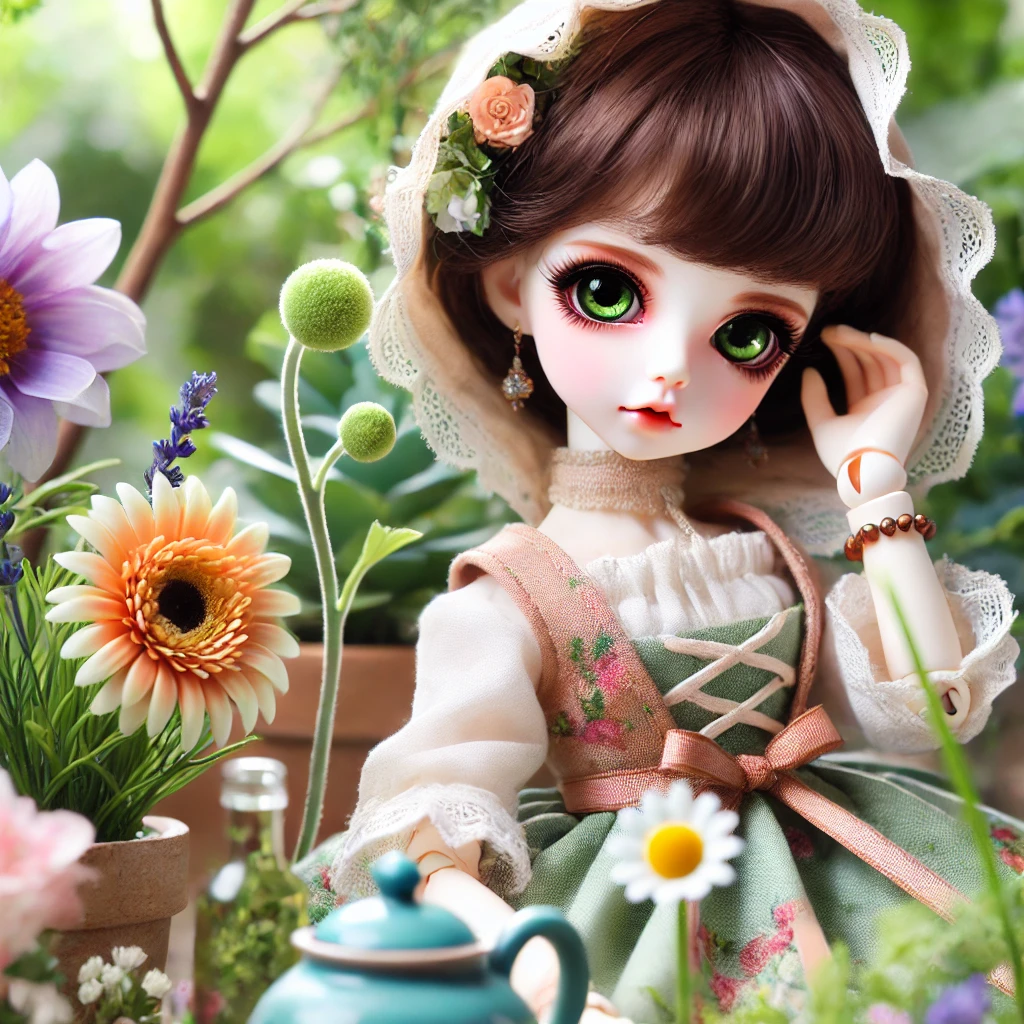
Key Takeaways
- Ball-Jointed Dolls(BJD) are highly customizable, articulated dolls primarily produced in Asia
- The modern BJD market originated in 1999 with the introduction of the Super Dollfie line by Volks
- BJDs range in size from 10 cm to 120 cm, with the most common sizes being 44 cm and 60 cm
- Prices for BJDs can vary significantly, ~에서 $100 to over $1000, with some limited edition or custom dolls fetching up to $5000
- BJD customization is a major aspect of the hobby, allowing owners to personalize their dolls’ appearances.
The Historical Evolution of BJD
Ball-jointed dolls (BJD) have a fascinating history that goes back to ancient times. The first BJDs were found in Greece and Rome, used for religious and ceremonial purposes. Later, in the late 19th and early 20th centuries, European makers started making bisque dolls with ball-jointed bodies. This was the start of the modern BJD world.
Japanese Traditional Doll Impact
Japanese traditional dolls, like the Ichimatsu dolls, greatly influenced BJDs today. These dolls were famous for their fine craftsmanship and detail. They inspired BJD artists to use traditional Japanese doll-making methods in their work.
Modern BJD Revolution
The modern BJD era started in 1999 with Volks’ Super Dollfie line in Japan. This design changed the doll-making world, bringing new articulation and customization. 약 2002-2003, Korean companies like Luts 그리고 Dollshe joined the market, growing the BJD world. In 2006, Dollzone, a Chinese company, made the first original Chinese BJD, showing the BJD’s global reach.
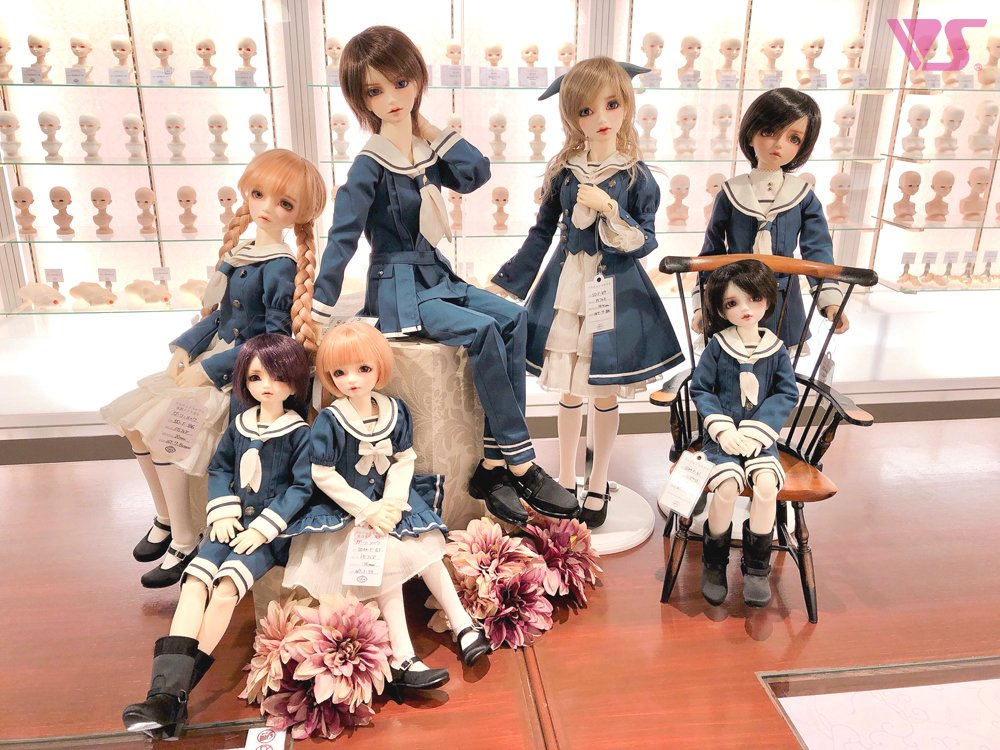
In 2007, Goodreau Doll, the first American BJD company, was launched. Today, BJDs are made by many different makers, each with their own designs and options. These dolls have become popular worldwide, loved by collectors, artists, and fans.
“An artistic collage illustrating the historical evolution of BJD dolls, featuring intricately designed antique dolls from the 18th century, transitioning to modern, highly detailed BJDs. Include diverse styles and textures, capturing craftsmanship from various cultures, with a focus on Knewland brand dolls. A warm color palette that reflects nostalgia and innovation.”
“The ball-jointed doll has become a canvas for artistic expression, allowing collectors and creators to bring their visions to life.”
The history of BJDs shows how ancient traditions, European influences, and modern doll-making came together. As the BJD world keeps growing and changing, it remains a lively place for doll-making and personalization.
Anatomy of a BJD Doll
Ball-jointed dolls (BJD) are known for their detailed anatomy and ability to pose. They have a special joint system that lets them move in many ways. Their big heads, large eyes, and bigger feet make them stand out.
Most BJDs can stand on their own thanks to their accurate body parts. Their joints, made of strong resin, are connected with elastic cords. This design makes them very poseable, perfect for creating interesting displays.
| BJD Structure Feature | Popularity and Prevalence |
| Headcap System | The most common separation design for dolls, showcasing its popularity among doll creators. |
| Faceplate Systems | Also prevalent in the doll industry, offering the ability to change the doll’s expression easily. |
| Neck Hole Attachments | Various methods are implemented, such as strings, metal bars, rings, or s-hooks, playing a significant role in doll customization. |
| Headplates | Incorporated by doll makers to distinguish genuine dolls from counterfeits, enhancing the collectible value. |
BJDs can be customized in many ways, from changing faces to modifying bodies. This has grown the BJD community. It’s a place where people can show their creativity and individuality through these dolls.
“The ball-and-socket joints of BJDs provide unparalleled poseability, allowing collectors to bring their doll characters to life in dynamic and expressive ways.”
Whether you’re new to BJDs or have been collecting them for years, their detailed anatomy shows the skill and creativity in the doll world.
Materials and Construction Methods
Modern ball-jointed dolls (BJD) are made from polyurethane synthetic resin. This material is strong and dense, perfect for detailed sculpting and painting. It’s hard and rigid, capturing the detailed poses and anatomy that BJDs are known for.
Polyurethane Resin Properties
The resin used in BJDs has many good qualities. It’s tough against chipping, cracking, and fading. This keeps the dolls looking new for a long time. It can also be molded in many skin tones, from real to fantasy, pleasing all BJD fans.
Stringing and Joint Systems
The dolls’ unique ball-jointed mechanism is thanks to a special stringing system. Thick elastic cords link the body parts, allowing for smooth movement and posing. The joints are carefully made for a natural feel, showing the quality of top BJDs.
Manufacturing Processes
BJD making can be done by hand or by machine. Some are hand-cast by artists, while others are made on a larger scale. The care in each step, from sculpting to casting, adds to the doll’s value and quality.
BJDs are made from strong resin, have detailed joints, and are crafted with care. This makes them not just beautiful but also poseable and durable. They’re a hit with collectors and customizers.
Size Categories and Classifications
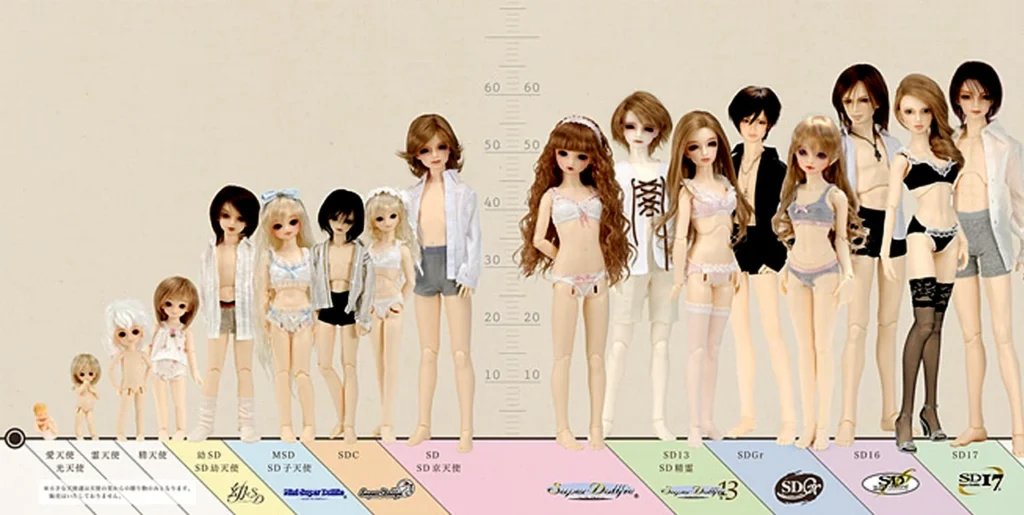
Ball-jointed dolls (BJD) come in many sizes, each appealing to different tastes and ideas in the doll world. These sizes affect the dolls’ looks and what age they seem to be. They also help decide who the dolls are for.
The most commonBJD sizes include:
- Tiny dolls – These dolls are 20cm or less. They are seen as 1/12 scale and look like they belong in a child’s world or a fantasy.
- Mini dolls – These dolls are between 40cm and 49cm. They are 1/4 or MSD (Mini Super Dolls) 규모. They can look like kids or adults, pleasing many tastes.
- Standard dolls – These dolls are 50cm or taller. They are 1/3 or SD (Super Dolls) 규모. They usually look like teenagers or adults.
- Extra-Large dolls – These dolls are over 80cm tall. They are a special size and often the stars of doll collections.
BJD makers have also created sub-classifications like “Big Baby” (BB), “Slim Mini,” and “Mature Mini.” These help meet more specific design needs and looks. The wide range ofBJD sizes, doll classifications, 그리고scale dolls lets collectors create stunning displays that show off their creativity.
Choosing the right size for a BJD doll is important. It’s not just about what looks good to you. It also affects what accessories you need, like wigs and shoes. Makers give size guidelines to help find the perfect fit and make the doll look great.
추가 독서: Volks BJD 인형의 최종 크기 가이드
The Art of BJD Customization

The world of ball-jointed dolls (BJD) is full of creativity and self-expression. At its core is customization, where fans turn these detailed figures into unique works of art. They use various techniques, 좋다face-up designs, bespoke wigs, and custom eyes, showing their passion and skill.
Face-up Techniques
그만큼face-up is key inBJD customization. Artists use watercolor pencils, acrylics, and soft pastels to give dolls life-like features. They seal these pigments with a matte spray, making each doll stand out.
Wig and Eye Customization
Wigs and eyes are also vital in changing a BJD’s look. There are many wig styles, 그림 물감, and textures to choose from. Swapping eyes allows for different emotions and expressions, adding to the doll’s personality.
Body Modifications
Customization goes beyond the face and accessories. It includes changing the doll’s structure. Collectors use sanding, epoxy putty, and even combining parts to create unique dolls. This shows the community’s passion and creativity.
Customization is what makes the BJD world special. It lets collectors add their own touch to their dolls. From face-ups to body changes, it’s a journey of self-expression and art.
A beautifully detailed BJD doll customization scene showcasing a variety of handcrafted outfits and intricate makeup designs, surrounded by art supplies and tools such as paints, brushes, and fabric swatches, set in a cozy workshop filled with soft natural light, emphasizing the artistic process and creativity.
BJD Market and Manufacturers
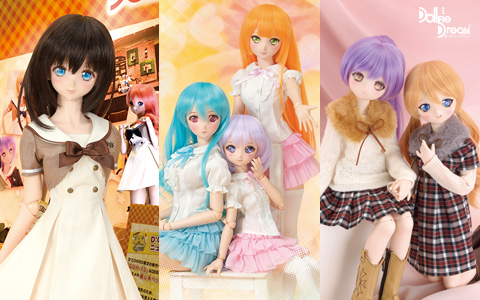
Image source: https://www.volks.co.jp/nierautomata/cn/about/
The Ball-Jointed Doll (BJD) market has grown a lot in recent years. It’s now worth around USD 1.5 billion in 2023. Experts think it will hit USD 2.8 billion by 2032, growing at 6.8% each year.
Asian manufacturers lead the BJD market. Big names like Volks (일본), Cerberus Project (South Korea), 그리고 Dollzone (China) are key players. TheseBJD companies serve a growing need for these detailed and customizabledoll manufacturers in theAsian doll market.
| Company | Estimated Annual Revenue |
| 사람들 | Over $20 million |
| Luts | $10-15 million |
| U-noa | 약 $5 million |
| Dollshe | $3-5 million |
Smaller companies and individual artists also play a big role in the BJD market. Prices range from $100 for mass-produced dolls to over $1,000 for hand-sculpted ones by skilled artists.
China and Japan are expected to keep leading the BJD market. They will hold about 35% of the global market share. North America and Europe will also play big roles, with around 25% 그리고 30% of the market share, 각기.
Collecting and Investment Aspects
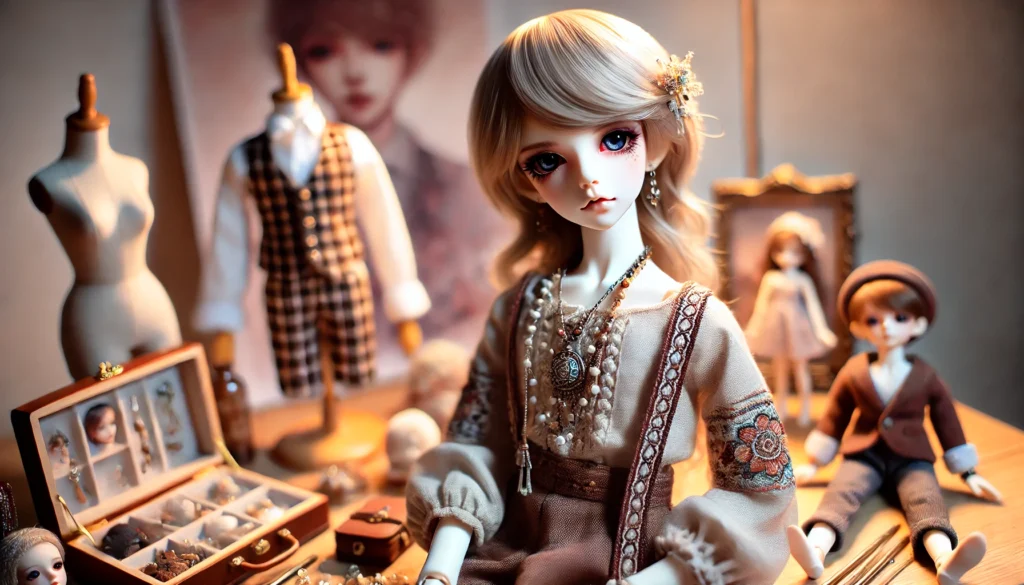
Ball-jointed dolls are now highly sought after by collectors. They come in limited editions and are often customized, leading to high prices. Enthusiasts might spend $300 to $2,000 or more on a doll, depending on its artistry and customization.
Market Values and Limited Editions
The BJD collecting community is booming. Online forums like Den of Angels have over 80,000 members worldwide. The “BJD Addicts” Facebook group has more than 17,000 active members. Brands like Volks often charge over $1,000 for a standard doll, making them a valuable investment.
하지만, Volks’ mini-size BJDs are gaining popularity. They are more affordable and easy to carry around. Limited edition BJDs can be worth up to $5,000. Themes like gothic and Lolita fashion, fairy tales, and fantasy creatures are especially popular.
In the secondary market, rare Volks BJD dolls can sell for thousands of dollars in online auctions. This shows how valuable these dolls can be.
Authentication and Quality Factors
In BJD collecting, verifying authenticity is key. There are many knockoffs and recasts out there. The doll’s sculpt, joint smoothness, and finish all impact its value.
“Limited edition releases by Volks vary in price, with some costing as much as $5000, depending on production quantities and unique features.”
The Global BJD Community
The world of ball-jointed dolls (BJD) is full of life and connection. People from all over share their love for these dolls online and in person. They exchange ideas and show off their creativity.
그만큼 Den of Angels forum is a big online spot for BJD fans. It has over 43,000 members. Here, they talk, learn, and share, feeling like they belong together.
BJD fans also meet up in real life. Events like Dollectable in San Francisco are popular. At these meetups, they can see each other’s dolls, learn new things, and talk about their hobby.
In Japan, Volks hosts Dolls Party conventions. These events are a big deal for BJD fans. They get to see new trends, meet others, and find special dolls.
The BJD community is all about creativity. People share tips on making dolls look unique. They also tell stories and show off their dolls in photos.
Whether it’s online or in person, the BJD community keeps growing. It’s a place where people feel at home and can express themselves through art.
“The BJD community is a place where creativity, passion, and camaraderie come together in a beautiful tapestry of self-expression.”
Artistic Expression Through BJD
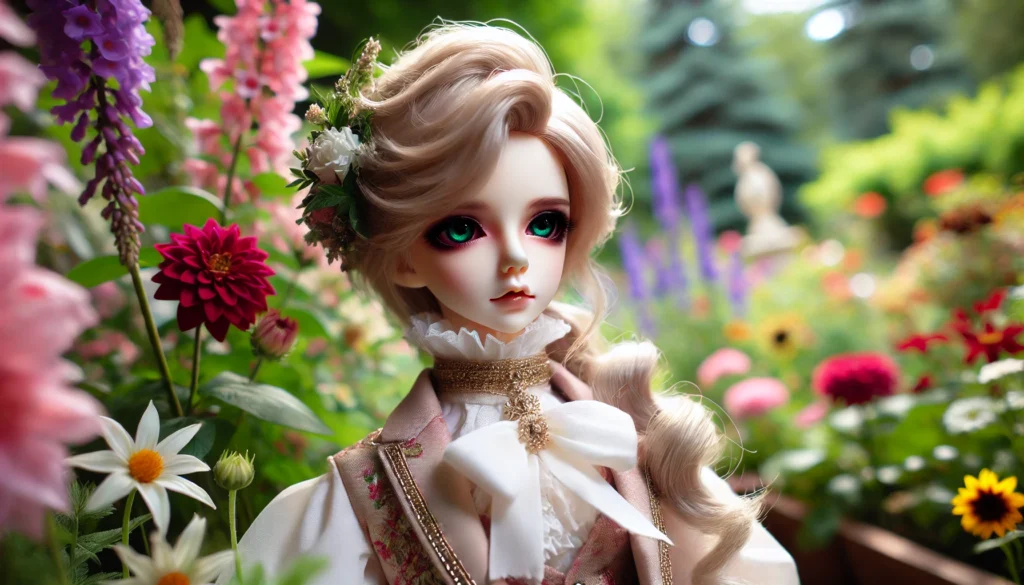
BJDs are a special canvas for art, drawing in many fans. They are used indoll photography and for telling stories with custom characters. This makes BJDs a great way for people to explore their creativity.
Photography and Visual Arts
Doll photography is a growing art form in the BJD world. Photographers use the dolls’ ability to pose and customize to create amazing scenes. They capture the dolls’ personalities in beautiful images.
By setting up scenes, adjusting lights, and using detailed backdrops, these artists bring dolls to life. They show off the dolls’ unique qualities and stories.
Character Creation and Storytelling
Many people enjoy making their own characters with BJDs. The dolls can be made to look like anything, from mythical creatures to historical figures. This lets collectors really get into their dolls’ stories.
They pick out the dolls’ looks, 옷, and accessories to match their characters. These dolls are often the stars of stories, games, or even personal writing projects. They help tell unique and detailed tales.
The BJD community shows how versatile and creative these dolls can be. From photography to storytelling, BJDs inspire and engage those who want to express themselves through art.
| Statistic | Value |
| Years Hana has been collecting BJDs | 19 |
| Years Hana has been painting face-ups and doing modifications | 14 |
| Time to complete a commission | 1-4 주 |
| Sculpts Hana enjoys painting | Migidoll, Crobidoll, Elfdoll |
| Materials used for face-ups | Artist Pastels, Liquitex Acrylic Paints, Watercolor Pencils |
Hana said it’s key to blend face-ups for depth and realism. She also stressed the importance of practicing, trying new things, and not giving up for those starting to paint and modify BJDs.
“The world of BJDs offers a unique canvas for artistic expression, captivating collectors and enthusiasts alike.”
Care and Maintenance
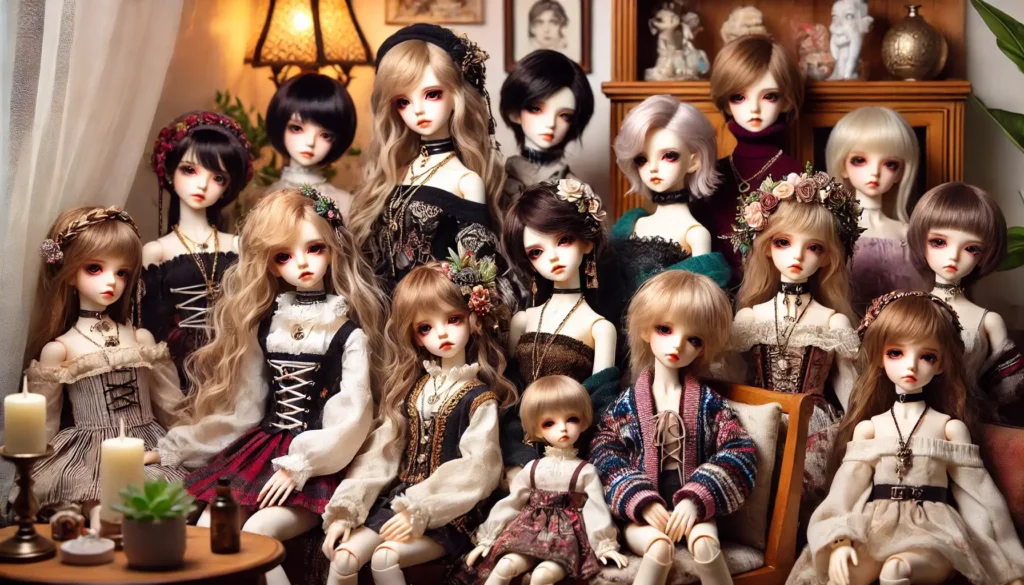
Ball-jointed dolls (BJD) are becoming more popular. It’s important to know how to take care of them. This keeps them looking great for a long time.
BJDs are sensitive to UV light, which can make them yellow. Keep them away from sunlight. Clean them gently with mild soap and water to keep them dust-free.
Joints need attention too. The elastic strings might need to be replaced. This keeps the doll moving well and prevents damage. Be careful when posing or changing clothes to avoid resin damage.
- Use a soft, damp cloth and mild soap to gently clean the doll’s surface, avoiding contact with internal mechanisms.
- For stubborn stains, try using a magic eraser or a cleaning solution designed specifically for BJDs, such as Winsor and Newton Brush Cleaner and Restorer.
- Avoid using harsh chemicals, nail polish removers, or oil-based products, as they can damage the doll’s resin.
- Consider using a sealant, such as MSC (Mr. Super Clear), Citadel Purity Seal, or Vallejo, to protect the doll’s finish and prevent discoloration.
Storing and transporting BJDs right is key. Keep them in a dry, clean place. Pack them well when you travel to avoid damage.
| Cleaning Recommendation | Percentage |
| Isopropyl Alcohol (Rubbing Alcohol) | 91% |
| Magic Erasers for Dirt and Stains | Recommended |
| Nail Polish Removers | Not Recommended |
| Winsor and Newton Brush Cleaner and Restorer | Recommended for Tough Stains |
By following these tips, your BJD dolls will stay beautiful and valuable for a long time.
추가 독서: 유지 보수 방법 BJD 인형? 사라지다 & 하지 말아요
Cultural Impact and Media Representation

BJDs have made a big splash in popular culture. They have won hearts around the world with their detailed design and ability to be customized. These dolls have appeared in movies, TV shows, and even influenced art and fashion, leaving a lasting mark.
BJDs in Popular Culture
The entertainment world can’t get enough of BJDs. They’ve starred in films like “Doll Master” (2004) 그리고 “Spider Lilies” (2007). They’ve also made an appearance in anime and manga, such as “Rozen Maiden” and “Another“.
Influence on Art and Fashion
BJDs have also made waves in the art world. In fashion, they’ve especially influenced Gothic Lolita, with their dreamy and playful look inspiring many outfits. Their unique style has also inspired artists and designers to include their features in their work.
BJDs continue to grow in popularity, captivating fans and sparking creativity in many areas. From movies to fashion shows, their impact is clear. They show the lasting appeal of these unique and expressive dolls.
| Metric | Value |
| Anime BJD dolls increase in popularity | Significant increase in recent years |
| Customization appeal of anime BJD dolls | Key factor in their popularity |
| Anime BJD doll community engagement | Active on online platforms like forums, 인스타그램, and TikTok |
| Global influence on anime BJD dolls | Blend of anime and Western pop culture themes and styles |
| Online access to anime BJD dolls | Facilitated by online marketplaces |
| Specialized retailers for anime BJD dolls | Provide wide selection and customization options |
| Future trend for anime BJD dolls | Increased cultural impact and engagement |
결론
Ball-jointed dolls, or BJDs, are a special mix of art, collecting, and personal expression. They have a rich history and are loved by fans all over the world. The BJD community keeps growing, exploring new ways to make these dolls and celebrating their beauty.
The making of BJDs shows the talent and hard work of their creators. They use different materials and techniques, like polymer clay and air-dry plastic. This variety means there’s a BJD for everyone, no matter their size or budget.
The world of BJDs is always changing, offering endless chances for creativity and storytelling. People use new tools and work together in masterclasses. This shows how much BJDs mean to those who love them, and their influence on art and culture will last.


